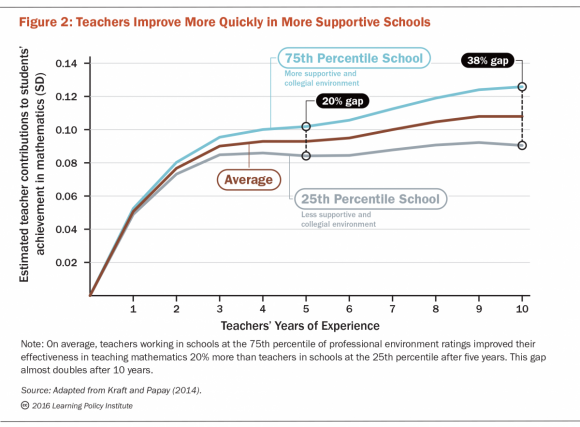There are a whole lot of things in this world of ours you haven’t started wondering about yet.
Old-Green-Grasshopper
Time to read, write, reflect and connect-the-dots this past month has deepen my conviction that teaching and the leading the development of teachers is a messy business. Teacher development is informed, artful and responsive more than it is a recipe to be faithfully followed. It requires direction (the film-maker type) trust and resource. The ROI – is almost always deferred. As we patient enough?
So here is the question I was investigating.
Do teachers in schools with stronger professional environments improve more over time?
A teacher who is at the 75th percentile of returns to experience is improving her effectiveness by almost 2% of a test-score standard deviation more annually than a teacher whose improvement follows the average returns to experience trajectory. The magnitude of these differences compounded over time so that after three years, teachers working in schools at the 75th percentile of professional environment show a 12% (0.010 SD) improvement gap, 20% (0.017 SD) improvement gap after five years than those teachers on average, a 20% gap working at schools at the 75th percentile. After ten years, 38% (0.035 SD) gap.

Kraft and Papay (2014) evidently show that the degree to which teachers become more effective over time varies substantially by school. That teachers in more supportive environments improve more and feel more successful because of this improvement, this “sense of success” can increase the likelihood they remain at their schools (Johnson & Birkeland, 2003).
What is the impact of the changing workforce demographic?
We know that student moves impact upon student outcomes. Do employment moves impact on teachers development? One would think that few teachers stay in any one UK school for 10+ years? What is the impact of moves? Presumably, the aggregated “magnitude of these differences compounded over time” will be impacted by school moves. I wonder if or how many moves are beneficial or impairing?
However, it is not merely that clear cut. Average returns to teaching experience mask large variation across individual teachers, and across groups of teachers, working in different schools. This is partly explained by a descriptive finding that there exist meaningful differences in the quality of the professional environment in which teachers work and the characteristics of it’s students and teachers.
Furthermore I get the impress that meta-analysis smooth out the lines of difference. We know from experience that within school variance is a leadership concern. That within good and poor schools, departments and classrooms experiences can vary significantly. I am unsure how to account for this variance.
The middle to later years
Teachers make rapid gains in effectiveness early in their careers, but that additional experience is associated with more modest improvements (e.g. Rockoff, 2004; Boyd et al., 2008; Harris & Sass, 2011; Wiswall, 2013; Papay & Kraft, 2012).
So what contributes most?
Variance in gains can be explained by “differences in teachers’ professional environments.” On average, teachers improve at faster rates in schools:
- with higher value-added scores – Loeb, Kalogrides, and Beteille (2012)
- with fewer low-income students – Sass and his colleagues (2012)
- with Principals that play a key role in promoting professional growth (Blase & Blase, 1999; May & Supovitz, 2010; Waters, Marzano & McNulty, 2003)
- where the Principal’s ability to lead effectively and support teachers’ practice stands out as a critical influence on teachers’ decisions to remain at their school (Grissom, 2011; Boyd, et al., 2011)
- where there are more effective grade-level colleagues, especially the performance of novice teachers, Jackson and Bruegmann (2009) leading to high-depth substantive interactions (Coburn et al., 2012).
- where there is a culture of mutual trust and respect (Bryk et al., 2010; Bryk & Schneider, 2002)
Student achievement improves:
- with the availability of common planning time predict school effectiveness, as measured by contributions to student achievement. Ladd (2009)
Professional development is most effective when it provides teachers active learning opportunities that are intensive, focused on discrete skills, aligned with curriculum and assessments, and applied in context (Correnti, 2007; Desimone, et al., 2002; Desimone, 2009; Garet et al., 2001; Wayne et al., 2008).
As leaders – how do we create that “common planning time.”
Instructional coaching – gets another mention. Teachers who were assigned randomly to participate in a program that used individualised coaching to improve teacher-student interactions were more effective at raising student test scores in the following year. As I keep thinking, teaching and teacher development is a messy.
Stepping back again to see the big picture
In a summary from Learning Policy Institute in 2016, Tara Kini and Ann Podolsky, offered four summary conclusions for policymakers:
- Teaching experience is positively associated with student achievement gains throughout a teacher’s career.
- As teachers gain experience, their students are more likely to do better on other measures of success beyond test scores, such as school attendance.
- Teachers make greater gains in their effectiveness when they teach in a supportive and collegial working environment, or accumulate experience in the same grade level, subject, or district.
- More experienced teachers confer benefits to their colleagues, their students, and to the school as a whole.
Any sports manager or coach convening a squad of players knows there is a place for the experienced, canny professional. Their influence extending beyond the dressing room, beyond the pitch, beyond the training ground. On how players conduct themselves and live their lives. Why would it be any different in any organisation or school?
I was surprised that more emphasis was not made of “prior experience in the same grade level, subject area, or district show greater returns to experience than those with less relevant prior experience,” highlighted in previous readings.


